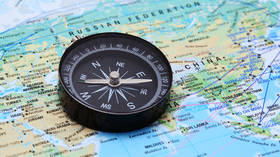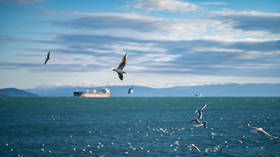Sanctions sped up Russia’s pivot to Asia – deputy PM

Russia’s energy exports to the Asia Pacific region surged last year as Moscow was forced to shift its trade away from ‘unfriendly’ Western countries, Russian Deputy Prime Minister Aleksandr Novak stated, in an article he wrote for Energy Policy magazine published on Thursday.
According to the senior official, oil supplies from Russia to Asian countries for the first time exceeded the volumes sent to Europe in May 2022. By the end of last year, oil exports to friendly countries (those that did not support sanctions against Russia) surged 76% year-on-year, oil-product exports by 20%, pipeline gas and liquefied natural gas (LNG) supplies by 8%. In total, almost 40 million tons of oil and oil products were redirected from Western to Eastern markets last year, Novak noted.
He said the surge in Asia-bound exports was the product of Western sanctions Russia faced following the start of its military operation in Ukraine. Restrictions have targeted many sectors of the Russian economy, including its energy exports. This has forced many traditional buyers in the West of Russian products and services to shun these.
“Over the past year and a half, due to the illegitimate actions of Western countries, Russia’s energy sector has significantly accelerated its pivot to the East, where the fastest-growing and most promising energy markets in the world are located,” Novak wrote.
At the same time, the deputy premier stated that the country had been working on diversifying its energy exports prior to sanctions and that now “this policy has fully justified itself.” According to the senior official, Russia was ready to quickly redirect significant volumes of energy resources thanks to the existing infrastructure that links it to Asian countries, including the ‘Eastern Siberia-Pacific Ocean’ (ESPO) and the ‘Power of Siberia’ pipelines as well as the Yamal LNG project.
Her also said that Russia plans to further boost energy exports to the East. According to forecasts, global energy demand may grow by 31% by 2050, compared to 2021, with the Asia-Pacific providing about 60% of the growth. This means that, for at least the next three decades, the Asia-Pacific will become the world’s main consumer of energy resources and the most lucrative market for energy exporters. According to Novak, Russia plans to lower the volume of energy it exports to the West to 40% this year, with the bulk to be redirected towards the Asia-Pacific.
Novak noted that Moscow is also working on ways to “ensure smooth access” of Russian energy to the global market. For instance, it plans to establish a new system of mutual insurance and reinsurance of cargos with friendly states, and to continue switching to national currencies in settlements with export partners. A significant part of settlements in Russian energy trade is already made in rubles, yuan and rupees, he added.
“Russia’s energy sector has enormous potential in terms of establishing and developing strong business and trade relations on an international scale, and of building reliable logistical chains. Despite external pressure Russia remains one of the key players in the global energy market. Our task is to make the most of the ‘window of opportunity’ opening new horizons, improve the competitiveness of the fuel and energy sectors and expand the geography of cooperation,” the deputy prime minister concluded.
For more stories on economy & finance visit RT's business section













